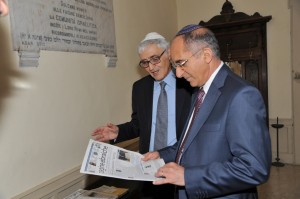NEWS Israeli Ambassador to the Holy See: “Taking Dialogue a Step Forward”
“The year 2014 is important for a number of reasons: Pope Francis’s upcoming visit to Israel; the twentieth anniversary of the establishment of full diplomatic relations between the State of Israel and the Holy See; the agreement on property and fiscal issues, which could soon be reached.”
Just a few days before Jorge Bergoglio sets out on his visit to Israel, Zion Evrony, the Israeli ambassador to the Holy See, speaks about what Israelis and Jews all over the world can expect from this crucial event, and in general from this Pope, regarding the political relations between the Jewish State and the Vatican, the continuation of interfaith dialogue, and the Papacy’s approach to Judaism.
Evrony was joined by the prominent Jewish historian Prof. Anna Foa in a public conversation presented by Rabbi Roberto Della Rocca, director of the Department of Education and Culture of the Union of Italian Jewish Communities (UCEI) and director of the Jewish cultural association Kesher, which organized the event that took place at the Jewish School of Milan.
It is the intersection of political, religious and theological dimensions that makes the relations between the Vatican and Israel so delicate and complex, as Professor Foa noted. “Until the Nostra Aetate declaration, the Church was not willing to recognize the State of Israel for theological reasons. Jews were the people who refused to accept Jesus as the Messiah, therefore they had to be punished, to live in exile, without a homeland, without rights.” Nostra Aetate was promulgated in 1965 by the Second Vatican Council. Among other things, it states that the Jewish people cannot be blamed for the death of Jesus, it encourages mutual understanding and appreciation between Catholics and Jews, it acknowledges a special bond between the two faiths, and it condemns every form of persecution against Jews.
“The approach towards Jews and Israel has slowly but radically changed as the concept of a special bond between Christians and Jews has become increasingly important,” continued Professor Foa. “At the same time, the Vatican also risked isolation by not recognizing Israel, while Israel had become a well-established member of the international community. Therefore, the 1993 agreement establishing diplomatic relations between the State of Israel and the Holy See is a lot more than a political agreement. However, understanding Zionism is still a challenge for the Church. In its view, the Holy Land is the place where three different sanctities coexist, the Christian, the Jewish and the Muslim. They collide with each other, or, at best, they reach a compromise for coexistence, but they do not go as far as to explore a deeper mutual understanding.”
Bringing the relations between the two States a step forward is the goal underlined by Ambassador Evrony.
Among other things, he mentioned how Israel and the Vatican share many interests, such as the concern about minority rights in the Middle East, the Syrian civil war, the fight against radical Islam, and the struggle against anti-Semitism. “Francis’s recent statement that a Christian cannot be an anti-Semite because of our common roots should be spread to the four corners of the world,” Evrony said.
“I also want to emphasize that the Pope will be warmly welcomed by all the people of Israel, irrespective of religion,” the Ambassador explained, referring to the recent episodes of vandalism against Christian buildings in Israel. “Those acts were perpetrated by a few extremists who do not represent anyone, neither the institutions nor the people of Israel. They are against our values.”
A crucial element regarding the enhancement of relations between Israel and the Holy See is interfaith dialogue.
“In the past, anti-Semitism was at the root of the Christian doctrine, not on the margins. Therefore, we can state that with Nostra Aetate, the Church has undergone a deep transformation within itself,” said Foa.
However, some challenges in the dialogue still remain for consideration.
“Today, many Christians consider the Jewish-Christian dialogue a way to rediscover their roots. On the Jewish side, this mechanism does not, and cannot, work. Our goal is helping others to understand us and fighting prejudice, and this creates a sort of asymmetry in the dialogue,” said Rabbi Della Rocca. Moreover, he evoked a family story that probably captures better than anything the mixed feelings towards such dialogue after 2,000 years of persecutions.
“During the Shoah, my father hid in a monastery in Rome and we are all grateful for that. At the same time, for ten months, the Mother Superior went to his room every night to try to convert him. This is why we can never forget that our relations with the Church are complex, and that there are both wounds and hope, history and politics, clashes and encounters.”
“I am certain that Pope Francis’s visit to Israel, like that of his predecessors, will contribute to the process of reconciliation, recognition and dialogue between the Jewish people and the Church and the relations between Israel and the Holy See,” concluded Ambassador Evrony.

